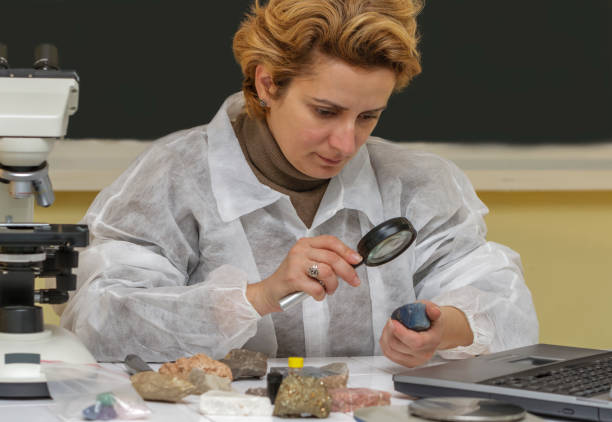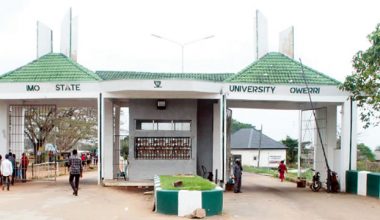If you are interested in learning the structure, evolution, and dynamics of the Earth and its natural mineral and energy resources, and perhaps make a living out of it, you should check out this article on geology courses in Nigeria.
It discusses everything there is to know about geology courses in Nigeria, including the best Nigerian universities that offer them.
We will also examine the length of time it takes to study geology and the job outlook for geologists and geoscientists in Nigeria.
This is to help prospective students understand what they are getting into career-wise, and know how best to approach it.
Table of contents
- What is Geology?
- Who is a GEOSCIENTIST?
- 10 Best Geology Courses Schools in Nigeria
- 10. Covenant University
- How Many Years are geology courses in Nigeria?
- Is Geology a good course to study in Nigeria?
- What is the jamb combination for Geology Courses?
- Where Do GEOSCIENTISTS Work?
- What is the Job Outlook For Geologists In Nigeria?
- Geoscientists Salary
- References
- Read Also
What is Geology?
According to the Geological Society of the UK, geology is the study of the Earth’s structure, evolution, and dynamics and its natural mineral and energy resources.
Geology investigates the processes that have shaped the Earth through its 4500 million (approximate!) year history and uses the rock record to unravel that history.
It is concerned with the real world beyond the laboratory and directly relevant to society’s needs.
Read Also: Official List of Federal University, Dutsin FUDMA Courses, Fees, and Requirements
Who is a GEOSCIENTIST?
Geoscientists oversee Earth’s ecology and resources. Their goal is to comprehend Earth’s and other planets’ natural processes. They research Earth, its oceans, soils, and atmosphere, predict the weather, create plans for land use, and learn about other worlds and the solar system.
Geoscientists advance our knowledge of Earth’s history and activities by identifying novel sources of valuable Earth minerals and assessing environmental effects.
Geoscientists offer crucial data for problem-solving and policy-making in resource management, environmental preservation, and public health, safety, and welfare.
What Do GEOSCIENTISTS Do?
Geoscientists gather and interpret data on Earth and other planets. They apply their expertise to enhance human well-being and broaden our comprehension of Earth’s functioning.
The geosciences are so large and diverse that their work and career pathways differ greatly. The principal geoscience fields recognized by the National Science Foundation are soil science, meteorology, hydrology, oceanography, marine science, atmospheric science, planetary science, and geology.
Geology courses in Nigeria
- Atmospheric scientists
- Economic geologists
- Engineering geologists
- Environmental geologists
- Geochemists
- Geochronologists
- Geologists
- Geomorphologists
- Geophysicists
- Hydrogeologists
Read Also: University Of Oduduwa School Fees, Courses, and Cut-Off Points
10 Best Geology Courses Schools in Nigeria
1. University of Ibadan
The University of Ibadan is ranked 1 of 157 in Nigeria for geology and is, of course, the best school to study Geology in Ibadan.
The University of Ibadan provides facilities, research opportunities, and specialized field schools that help students polish their abilities and prepare for fulfilling geosciences careers.
Currently, the Department offers B.Sc, M.Sc., and MPhil. And P.hD. in Geology, with options in Geophysics, Petroleum Geology, Environmental Geology, Geochemistry, Sedimentology, Palaeontology, Mineral Exploration, Hydrogeology and Engineering Geology.
2. University of Nigeria
As one of the oldest universities in the country, the UNN, established in 1961, also has one of the best and oldest Geology departments.
The alumni of this program comprise the necessary labor force for Nigeria’s mining, oil, and associated industries.
The Department provides a five-year Bachelor of Science (B.Sc.) program in Geology and a combined Geology and Physics degree program. It is also a hub for research and teaching at the university.
3. Obafemi Awolowo University
The Physical Sciences Building houses the Department of Geology at Obáfémi Awólówò University, Nigeria. The university boasts the most exquisite home campus in Africa.
The campus is located in the historic city of Ilé-Ifè, which is considered to be the cultural capital of the Yorùbá people and their cradle.
In April 1965, the Department was founded as a division inside the Physics Department at the University of Ifè’s Ìbàdàn campus.
Before introducing the BSc Applied Geophysics degree program in the 1974–1975 academic year, the Department offered a BSc degree in Geology.
It was the first Department in Nigeria to offer an undergraduate program in Applied Geophysics.
4. Ahmadu Bello University
The Department of Geology was founded in 1967 at Ahmadu Bello University in Zaria by an act of the University Senate during the administrations of Alexander as Vice-Chancellor and Harris as Dean of the Faculty of Science.
The Department began with three offices in the Physics Department in the Middle Block, home to the Physics and Mathematics Department, and a laboratory on the ground level of the Eastern Block, which was later home to the Departments of Geography and Architecture.
The Ahmadu Bello University Department of Geology offers a BSc program, a PGD, a Masters’s Program, and a Ph.D. program.
Read Also: UNN Cut-Off Marks for all Courses and Fees | 2024
5. Federal University of Technology, Akure
The Department of Applied Geology was created in 1982 as part of the erstwhile School of Earth and Mineral Sciences (SEMS).
Since then, it has been one of the best departments of Geology in the country, with outstanding undergraduate and postgraduate programs.
List of FUTA Cut off Mark for all Courses 2024 | FeesThe Federal University of Technology, Akure Department of Geology offers a five-year program for its students, after which they will be awarded a Bachelor of Technology in Applied Geology (B. Tech. Applied Geology).
They also have a robust post-graduate and research program. Through their training, the program’s graduates will gain a foundational understanding of geology and the geological methods and abilities needed to explore and exploit rocks, water, and mineral resources—all essential components of a country’s socioeconomic development.
6. University of Lagos
The University of Lagos, popularly known as Unilag, is one of the best and most popular higher institutions in the country.
Their department of Geoscience is one of many departments in the school’s biggest faculty, the Faculty of Sciences.
They offer undergraduate and postgraduate programs to interested students seeking admission to study Geosciences.
The programs are intended to train and create geology and geophysics graduates who satisfy professional and scientific demands and the workforce requirements of academic, research, and governmental organizations, industry, and other relevant fields.
Teaching and research about the application of geological and geophysical techniques for developing natural resources and resolving environmental concerns are also accorded high attention.
7. University of Port Harcourt
The Department of Geology in Uniport was established in 1976 to expose students to all aspects of training in theoretical, practical, and field geology. Geology as a discipline offers a lot of challenges to those undertaking University training in the field.
The Department provides professional support services to corporate entities in and outside Nigeria and offers undergraduate training programs through teaching and research.
These programs are designed to give students the tools and preparation they need for a demanding and fulfilling career.
After this program, graduates can anticipate a variety of employment options in the public and private sectors and the opportunity to work for themselves.
The Department is staffed by highly qualified experts whose backgrounds span a variety of life endeavours and only offers an undergraduate program. After completing a program, students will be rewarded with (B.Sc in Geology).
8. University of Benin
The University of Benin is one of the best federal Universities in the South-South region of Nigeria and has many departments, like the Geology department, for students to choose from.
The Department of Geology Uniport aims to support each student’s intellectual and professional growth by offering a rigorous undergraduate curriculum that prioritizes fieldwork and independent study.
The department courses offer a thorough examination of the fundamental concepts of Geology.
The school only offers undergraduate programs for now and allows for direct-entry students.
Read Also: LUTH School of Nursing Cut Off Mark, Fees and Admission Requirements | 2024
9. University of Ilorin
The University of Ilorin’s Department of Geology and Mineral Sciences is part of the Faculty of Physical Sciences.
They offer an intensive undergraduate degree program in geology to interested students who are ready to be among the best in their chosen field.
With a robust and active student body, the Department of Geology and Mineral Sciences Unilorini is a place that promises to help you advance academically when it comes to anything Geology.
10. Covenant University
Covenant University is arguably one of the best universities in Nigeria and perhaps the best private university and it’s no surprise they would be on this list of Best Geology Courses Schools in Nigeria.
Their approach to education and extension Geology is quite obvious in the Nigerian education sector.
Another reason to consider getting your Geology degree at Covenant University is that they stick to their academic timeline, and you do not have to deal with strike issues like you might encounter if you choose a public university.
Covenant University only offers an undergraduate program at the time of this report, and you can start the admission process immediately here.
How Many Years are geology courses in Nigeria?
Geology courses in Nigeria are usually a four-year course. But if you are going through a public university, you might want to peg it as a five-year course.
To account for strikes and all that have sadly become part of the academic calendar in Nigerian public-owned universities.
Is Geology a good course to study in Nigeria?
Yes, Geology is a good course to study in Nigeria. This is because, amongst other things, Nigeria is richly blessed with mineral resources, including the Liquid black gold.
Therefore, multiple exploration and mining activities are happening, which makes Gelogy lucrative as their expertise would be needed.
Additionally, the country is still very much growing economically and in infrastructure, so graduates of geology courses in Nigeria can help as consultants to engineers and corporations.
Read Also: List of Approved School of Nursing in Nigeria | Updated
What is the jamb combination for Geology Courses?
Below are the subject combinations for Jamb and Direct entry for students interested in Geology at any Nigerian University.
UTME and Direct Entry Requirements to Study Geology
Direct Entry Requirement for Geology:
- (i) Two (2) Level passes from Geology, Chemistry, Mathematics, Physics, Biology, and Geography.
UTME Requirement for Geology:
- Five (5) SSC credit passes in English Language, Biology, Chemistry, Mathematics, and any other subject.
UTME Subject combination for Geology:
- Any three (3) of Chemistry, Physics, Mathematics, Biology and Geography
Where Do GEOSCIENTISTS Work?
Geoscientists or geologists can work in several places. They sometimes can be seen sampling the deep ocean floor or examining rock specimens from the Moon or Mars.
In addition to holding many other demanding jobs, they explore new mineral and hydrocarbon resources, advise on engineering and environmental issues, do research, and teach, write, edit, and curate museums. They frequently split their time between working in the office, lab, and field.
Fieldwork typically involves making observations, collecting samples, utilizing geophysical gear to explore the subsurface, and taking measurements that will be examined in a lab.
Rock samples, for instance, can be examined using an electron microscope, X-rayed, or otherwise to ascertain their physical and chemical characteristics. In addition to creating computer models and conducting experiments, geoscientists can evaluate theories on geologic processes and occurrences.
In the office, they combine data from the field and the lab and create reports and presentations that contain diagrams and maps showing their research findings.
These maps can identify subsurface conditions or risks that could impact building sites or land usage and the potential locations of ores, coal, oil, natural gas, and water resources.
What is the Job Outlook For Geologists In Nigeria?
The employment outlook in geosciences—as in any profession—varies with the country’s economic climate. However, the long-range outlook is good at this time.
Dwindling energy, mineral, and water resources and increasing concerns about the environment and natural hazards present new challenges to geoscientists.
However, Nigeria is blessed with crude oil. It is the major source of income for the country. So, Geology puts you in a position where companies are looking out for what you have to offer with an enticing paycheck.
With this in mind, you can work in various industries, such as Oil and gas exploration and Mining and mineral exploration. You could also work as a consultant or a Geotechnical engineer.
Government agencies and academic institutions are also very viable as they employ the most Geologists in Nigeria.
In either of these industries, you can earn a million naira or more as an entry-level staff member annually, and of course, your earnings will increase as you garner experience.
Geoscientists Salary
Salary scales vary from employer to employer depending on the geoscientist’s career path, location, qualifications, and, of course, the economy.
Payscale.com reports that geoscientists in Nigeria earn an average of 4.5 million Naira a year, which would be around 375,000 per month, including the bonus.
Read Also: Nexford University Courses, Fees & Requirements
FAQs About Geologists
Our data indicates that the highest pay for a Geologist is NGN 11m / year
Our data indicates that the lowest pay for a Geologist is NGN 152k / year
Increasing your pay as a Geologist is possible in different ways. Change of employer: Consider a career move to a new employer that is willing to pay more for your skills. Level of Education: Gaining advanced degrees may allow this role to increase their income potential and qualify for promotions. Managing Experience: If you are a Geologist who oversees more junior Geologists, this experience can increase the likelihood of earning more.
Conclusion
Geology may not be as popular as other science courses, especially in Nigeria. Still, it’s an essential course that can help change the Nigerian economic situation as we know it today.
With the right hands and the right set of brains getting the required Geology Education In Nigeria, our oil and gas sectors can change as we know.
It could also improve the way we handle mining activities in the country, which will in turn improve the economy.
For this to happen, prospective geologists and Geoscintis must get their education in any of the best Geology schools in Nigeria mentioned above.
References
- www.geolsoc.org.uk – Geology Career Pathways
- www.lsu.edu – Why Study Geology?
- www.payscale.com – Average Geologist Salary in Nigeria
- gingeredu.info – Studying Geology in Nigeria: Career Growth, Job Opportunities, More
Read Also
- Eleyele School of Nursing Cut-Off Mark, Courses, Fees, and Requirements
- Godfrey Okoye University Courses and Fees | 2024 Requirements
- Official List of Cheapest Schools of Nursing in Nigeria and Their Fees 2024
- What Course Can I Study with 165 Jamb Cut off mark in 2024? | Universities and Fees
- 15 Best Architecture Courses in Nigeria | Universities, Requirements and Fees






